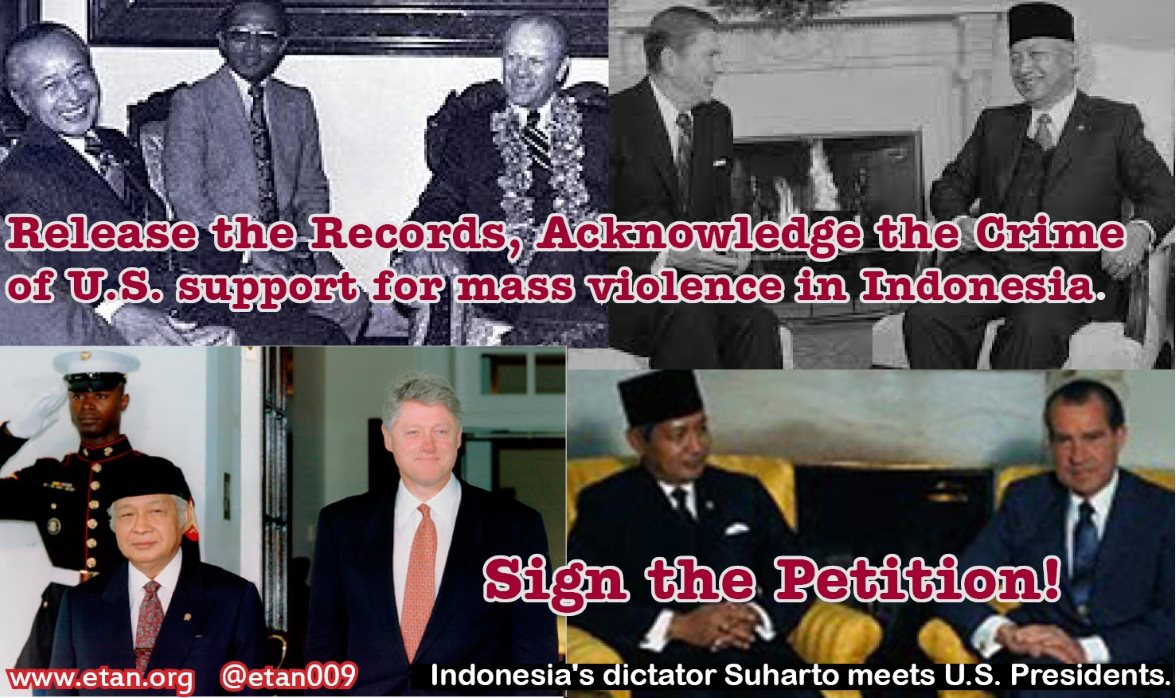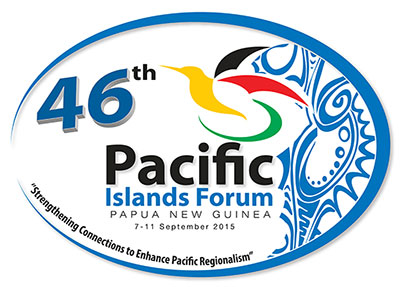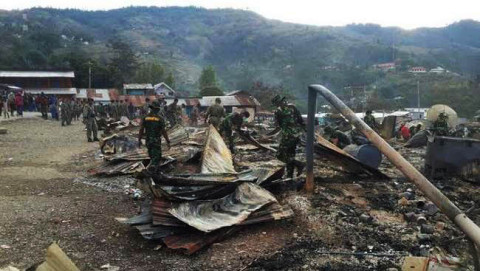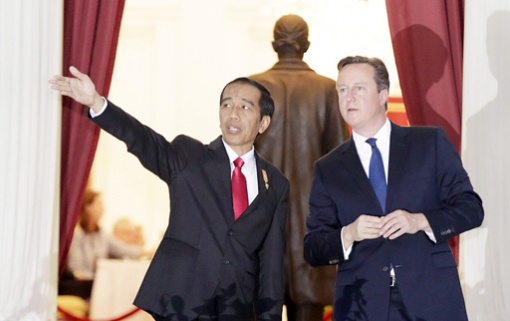
|
|
West Papua Report
|
|
|
|
|
Fires burn in Tolikara on July17. |
Tolikara District Chief Usman G. Wanimbo told media that he had urged that the Idul Fitri celebration take place at a different site because it was too close to a simultaneous gathering by the Evangelical Church (GIDI). The District Chief's advice to the police precinct chief (Adj. Sr. Commander Soeroso) was ignored. Wanimbo also claimed that use of the loudspeaker was not authorized. While Indonesian officials reacted quickly and strongly to the demonstration which turned violent, there has been little official reaction to the security force's lethal attack on the demonstrators. This failure of government officials to address what many saw as an over-reaction by security forces has drawn criticism from Papuan officials and others.
President Joko Widodo, July 24, met with representatives of the conflicting communities, including religious leaders from the district and Papua province in an attempt to calm the situation and present further violence.
"All of us deeply regret the incident, and we have now made peace and returned to living alongside each other." |
Locally, religious and other leaders acted to calm tensions. Muslim and Christian leaders in the Tolikara area met to resolve the issues that generated the July 17 incident. After a July 22 meeting, local Muslim and GIDI leaders reportedly "hugged each other as residents from the Muslim and Christian communities witnessed the truce agreement. The settlement was preceded by community work to clean up debris from last Friday's fire." On Wednesday, July 29 representatives of the GIDI and Muslim communities in Tolikara signed a seven-point reconciliation agreement (see below).
|
|
|
|
Aftermath of destruction on Tolikara. Credit: Dok Istimewa/WMS |
The Civil Society Coalition for Peace held a prayer vigil at the end of July at parliament in Jayapura. Nahdatul Ulama Papua Regional Board member Ustad Rasyid Mayang said religious leaders and others in Papua could solve this misunderstanding without having to involve the outsiders. He said they know the current situation in Papua than others.
Benny Wenda, spokesperson for the United Liberation Movement for West Papua (ULMWP), blamed police for the violence. "Our problems are with Indonesia's illegal occupation of our country, not between Christians or Muslims. My people have always live peacefully side by side with all Papuans of different faiths but the Indonesian police and military have always wanted and always tried to stir up religious conflict to draw the world's attention away from our freedom struggle."
Indonesian government transmigration policies, in force since early in the Suharto dictatorship, have sown the seeds of communal conflict throughout the Indonesian archipelago. The tensions have developed as migrants have been moved, sometimes against their will, from their native regions to other parts of the archipelago where they are frequently received with hostility by local inhabitants. The hostility is fanned by the government's seizure without compensation of local land and resources for the incoming migrants. Moreover, the juxtaposition of migrants and indigenous peoples who have differing ethnic/racial and religious backgrounds, as well as government support for newly arriving migrants against the backdrop of historic government neglect of indigenous inhabitants, have generated deep animosities.(See below for a brief look at demographic trends that show Papuans are becoming a minority in their own country.) Security forces often exacerbate these differences to bolster their position.
Over the decades, transmigration-stoked conflict has exploded in many areas targeted for transmigration, including Kalimantan, Sumatra and West Papua. Typically, as news of incidents of ethnic or religious conflict spreads, members of the victim community in one area exact vengeance against the attackers in other areas, leading to a metastasizing of the communal violence. The quick actions at aimed reconciliation in Tolikara will hopefully undermine those who would use events there to justify violence elsewhere.
Seven
Point Agreement Between Christian and Muslim Communities in Tolikara
Jubi, July 30, published the text of an
agreement between the GIDI and Muslim communities at Tolikara, where
they agreed to resolve the conflicts that resulted in the destruction
of a mosque. They also "agreed to solve their problem alone without
any intervention from others outside of Papua." The agreement consisted
of the following seven points:
1. Incident that occurred on the celebration
of Eid al-Fitr on Friday, 17 July 2015 in Tolikara Regency is not a
religious conflict but only 'miscommunication' between both parties
and we express our condolence at the lost of both life and goods.2. We sincerely forgive each other.
3. We agree to go through the customary law in order to end the dispute and ask both parties to must end the legal process.
4. We agree to rebuild the Musholla (little mosque).
5. We agree to review this agreement regularly and maintain the peace and harmony between both parties.
6. We will mutually maintain, respect and appeal to the entire religious communities in Indonesia to keep respecting to both GIDI and Muslim communities to do prayer as usual.
7. We call on government to guarantee the freedom of religion and faith practice as well as the freedom to build the worship house.
UPDATE
Pressure Builds for Justice in Paniai Travesty
Pressure continues to build on the Indonesian government for a credible resolution of the December 8, 2014 murder of four students and wounding of dozens of other civilians in Paniai. On July 13, the deputy chair of the Special Committee of the Papua Legislative Council on Human Rights noted that President Widodo had yet to fulfill his human rights promises."
"Up to now there is no seriousness to resolve Paniai case . Whereas the people of Papua, victims and victims' families are now awaiting confirmation on completion of it. Jokowi should be able to uncover who is behind the shooting action," said Deputy Chairman Decky Nawipa.
Frits Ramandey, acting chair of Komnas HAM Papua, said that the Human Rights Commission's ad hoc team had been unable to go to Paniai to conduct an investigation because there is a "tug [of war]' with a team formed by police headquarters. "People are worried that, if the case is handled by a Police Headquarters team, perpetrators will not be brought to the Human Rights court," Ramandey said.
|
|
|
|
PapuaItuKita collects coins to fund Komnas HAM investigation. via Twitter. |
PapuaItuKita Coordinator Zely Ariane told Jubi by email from Jakarta that the group had collected the donations because "Komnas HAM said they had no budget to continue the investigation." She was critical of the competing investigations including one by the military. "Since the beginning PapuaItuKita has demanded that the National Human Rights Commission take the lead in the investigation, in accordance with Law No. 26/2000."
In Jayapura, Student Independent Forum (FIM) handed over Rp 608,000 to the Komnas HAM Papua office to fund the Ad Hoc team.
Freeport's Permit Extended Six Months, Long-term Renewal Waits
The Indonesian government has officially extended Freeport's permit to export copper concentrate for six months. The permit had been held up month over Indonesian requirements that corporations process ore before export.
|
|
|
|
Freeport's Grasberg mine in West Papua. |
Freeport has said "it will spend $15 billion on an underground expansion at its Grasberg copper and gold mine" and a new smelter will cost $2 -$2.5 billion. Freeport's contract covering the Grasberg expires in 2021, but Indonesia law says that the earliest it can be extended is 2019. The U.S. mining giant lobbying for contract negotiations to get underway sooner.
Earlier in the month, President Joko Widodo indicated that he would approve revising Freeport's contract. The president had met with Freeport chair James "Jim Bob" Moffett on July 2. Energy and Mineral Resources Minister Sudirman Said told the Jakarta Post "that it would be economically 'impossible' for the government to cut its investment relations with Freeport."
Despite the temporary resolution of the license issue, analyst Ikrar Nusa Bhakti of the Indonesian Institute of Sciences (LIPI) told the Jakarta Post that the future of PT Freeport McMoRan in Indonesia is "hanging in the balance" since the government refuses to negotiate the extension of Freeport's contract until two years before it expires. While Freeport reports that it has donated large sums for education in Papua Bhakti asks, "But how many schools have they built? How many Amungme people [the main tribe in Mimika] have benefited from this program?"
Critical environmental issues at the Grasberg mine include reducing emissions from massive energy consumption, managing biodiversity, restoring natural habitats and correcting tailing disposal. |
"In the event of extending the mining contract the government should include provisions on the environment that are not related to those already contained in relevant regulations," he writes. "Critical issues such as reducing emissions from massive energy consumption, managing biodiversity, restoring natural habitats and correcting tailing disposal" must also be included.
Tarigan then moves to what many West Papuans believe to be the heart of the issue:
"The other aspect is whether it is appropriate for President Joko 'Jokowi' Widodo to decide on the future contract without consulting the people of Papua who are already placed at a disadvantage. The government's position should be the outcome of its consultation with Papuans, especially those subjected to the direct impact of Freeport's operations for almost 50 years."
In a separate analysis, Revrisond Baswir, a lecturer at Gadjah Mada University's school of economics in Yogyakarta, argues that increasing local control over Freeport involves more than requirements to build smelters and use domestic products in their operations. "If the government is really serious about distributing the cake of development to Papua," he writes then "it has to oblige Freeport to have its headquarters in Papua rather than in Jakarta. It also has to force the company to employ locals as it will automatically empower them. Locals will never be empowered unless they are trained."
[Rio Tinto, Freeport's partner in Grasberg, is currently facing criticism for plans to mine on public land and land considered scared by local Native Americans, including the San Carlos Apache, in Arizona.]
see also ETAN and West Papua Advocacy Team (and some friends) on the mining giant Freeport McMoRan

Calls to Reduce Security Forces in West Papua
On the anniversary of the July 6, 1998 Biak Massacre, Peneas Lokbere, the Coordinator of United for Truth (BUK) called for a reduction of organic and non-organic military troops in Papua. He cited a number of military posts in Meepago region. "There are so many soldiers at the post but have nothing to do so they shot people for killing time. There is a troop with unclear intention. They shot people with the weapons that were bought with people's money," Lokbere said.Separately, the chair of the Papua Legislative Council's committee on human rights, Laurenzus Kadepa, said military and the paramilitary Brigade Mobile police (Brimob) plans to expand in Papua are "for the benefit of investors in Papua." Adding, "so there will be mining military and military posts for the benefit of investors."
He said that the Papua Legislative Council is opposing plans for a Brimob headquarters in Wamena. "Now native Papuans are increasingly helpless. They are suffering on their own land. State seems no longer consider them," he said.
(See also West Papua Report's two-part Perspective on Indonesian Security Forces in West Papua (Part 1, Part 2)
CHRONICLE
West Papuans Becoming Minority in Own Land
Rights activist Makus Haluk discussed the rapid conversion of West Papua from a majority Papuan province to one with an overwhelming non-Papuan majority. Projecting current trends, the Haluk believes that West Papuans will constitute only 15 percent of the population of their homeland by 2030.
Budiardjo Urges Britain to Address British Petroleum in West Papua
|
|
|
|
Indonesia's President Widodo with UK's Prime Minister David Cameron i Jakarta. |
In an open letter veteran human rights activist Carmel Budiardjo wrote:
Prime Minister, David Cameron, has ignored many serious problems he should have raised with the President of Indonesia.
Although one major company, British Petroleum has investments in Bintuni Bay, West Papua, is the British Government not aware of the flagrant violation of human rights being perpetrated almost every day in West Papua where dozens of people land up in jail simply for flying a flag in a peaceful demonstration?
The two governments have signed an accord condemning terrorism, but what about the acts of terrorism committed almost on a daily basis by the Indonesian Army whose officers and men are present everywhere in West Papua.
When Mr Cameron gets back to London, he should familiarize himself with what is happening in West Papua. My organization Tapol could inform him of the true situation in West Papua.
Carmel Budiardjo, Recipient of the Right Livelihood Award, 1995.
West Papua "Embassy" Set Up in Darwin
West Papua activists set up a traditional hut July 7 on the grounds of the Northern Territory Parliament House in Darwin. The group told Guardian Australia that their application to "the parliament for the hut to remain on the site as a cultural embassy," was denied and they were evicted after two days.The group of West Papuans and Australians highlighted military ties between Australia and Indonesia. "The Indonesian government sends a lot of troops to Australia to be trained and funded, then after that they go back. This military kills West Papuans, which is why we want the Australian government to see this situation," said Peter Elab.
Open Letter to Pacific Islands Forum Leaders
 The
Pacific Islands
Forum leaders next meet that will be held from
7 to 11 September 2015 in Port Moresby, Papua New Guinea.
The
Pacific Islands
Forum leaders next meet that will be held from
7 to 11 September 2015 in Port Moresby, Papua New Guinea.
The Australia West Papua Association (Sydney)
urged the forum to discuss "the deteriorating human rights situation
in West Papua" and "acknowledge these concerns in the official communiqué."
In its open letter to the leaders, AWPA details a number of human
rights violations that have taken place in the year since the PIF
last met. The letter highlights "glaring omission" of West Papua
among "the large number of non-self- governing territories and organizations
that have various types of status at the PIF." AWPA then urges the
PIF "grant observer status to genuine representatives of the Melanesian
people of West Papua, those who are struggling for their right to
self-determination." Member countries of the PIF are Australia, Cook Islands, Federated States of Micronesia, Fiji, Kiribati, Nauru, New Zealand, Niue, Palau, Papua New Guinea, Republic of Marshall Islands, Samoa, Solomon Islands, Tonga, Tuvalu, and Vanuatu . A list of observers, associate members and dialogue partners is here: http://www.forumsec.org/pages.cfm/about-us/
Link to this issue: http://etan.org/issues/wpapua/2015/1508.htm.

|
|
|
||||

|
ETAN's other twitter accounts: |
||||
|
|
||||
|
|
||||
|
ETAN's Key Contact List |
Action alerts, media releases, key news and other resources on East Timor (Timor-Leste) and Indonesia selected by ETAN, focused on ETAN's program and priorities | ||||
|
Subscribe to
ETAN's
e-mail Listservs on Timor, West Papua and Indonesia human rights Join ETAN, Sign up today! |











